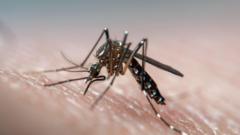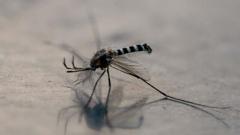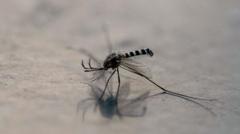The University of California teams have discovered that modifying male Aedes aegypti mosquitoes' hearing can help control populations that spread diseases like dengue. By targeting specific genetics responsible for sound detection, researchers have succeeded in preventing males from mating with females, thereby offering a potential new strategy for disease control.
Innovative Technique to Combat Dengue: Genetic Modification of Male Mosquitoes

Innovative Technique to Combat Dengue: Genetic Modification of Male Mosquitoes
Researchers have developed a novel method to decrease the reproduction of mosquito-borne disease carriers by rendering male mosquitoes deaf, thus impeding their mating chances.
Scientists have found a unique approach to address the ongoing challenge of mosquito-borne diseases such as dengue, yellow fever, and Zika. By rendering male mosquitoes deaf through genetic modification, researchers believe they can significantly disrupt their mating habits, resulting in decreased populations of disease-spreading insects.
In the wild, male mosquitoes depend heavily on their sense of hearing to locate and court females, using the alluring wingbeats of females as their guide during mid-flight copulation. However, a team of researchers from the University of California, Irvine conducted an experiment to explore breeding disruption by altering a specific genetic pathway linked to the males' hearing abilities. Their findings indicated that after undergoing genetic modifications, these male mosquitoes failed to engage with females, even after extended periods in the same environment.
The focus of the study was primarily on Aedes aegypti mosquitoes, notorious for transmitting diseases to approximately 400 million people yearly. By studying the intricate aerial mating behaviors of these insects—typically shorter than a minute—the researchers aimed to understand the mechanisms behind their reproduction. They specifically targeted a protein known as trpVa, which plays a critical role in sound detection among male mosquitoes.
The results were striking; the genetically modified male mosquitoes showed no response to the mating calls of females. This led to a complete absence of mating activity among the modified males, which sharply contrasted with their wild counterparts who copulated frequently and fertilized nearly all available females.
Dr. Joerg Albert, an authority on mosquito mating patterns from the University of Oldenburg in Germany, weighed in on the implications of this research. He asserted that interfering with the mosquito's auditory capabilities presents a promising strategy for population control, provided it is undertaken with careful study and oversight. The idea that the absence of sound perception could lead to male mosquitoes being unable to find females raises questions about the potential for extinction in certain species, underscoring the delicate balance of ecosystems where mosquitoes exist.
Additionally, Dr. Albert pointed out that while expedited measures like releasing sterile male mosquitoes in affected areas are currently being explored, any control method must consider the ecological importance of mosquitoes as a food source for various species, including fish, birds, bats, and frogs, as well as their role in pollination.
This breakthrough in genetic research offers a glimpse into innovative methods that may help mitigate the challenges posed by mosquito-borne illnesses, ensuring a more sustainable approach towards health and ecological stability.










